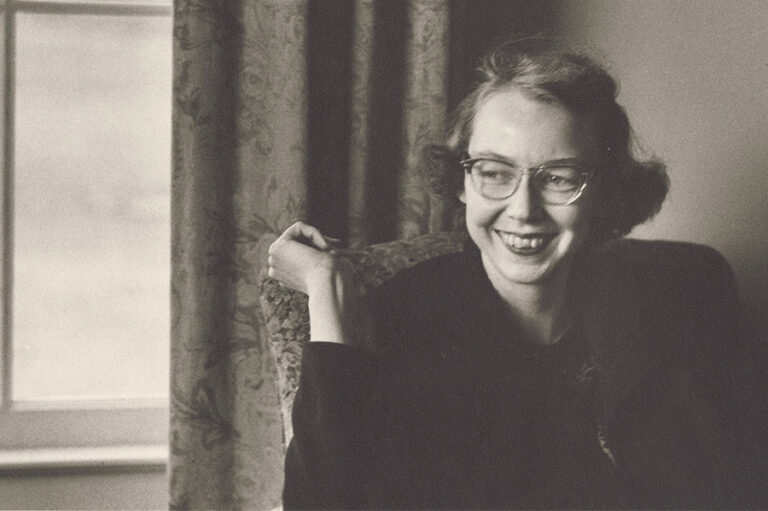
Tim and I had a date night last Friday. I had read about the new film about the author, Flannery O’Connor and so I was excited to find out that it was showing at a theater nearby. Both Tim and I are intrigued by O’Connor’s writing, her short stories like, A Good Man Is Hard To Find and The Lame Shall Enter First so indelibly printed on our minds and hearts. To read that Ethan Hawke directed a new film about O’Connor titled Wildcat and cast his daughter in the role of Flannery, was intriguing and exciting.
It had been a while since we had been to a movie theatre and this made it more fun. It turns out that in the big movie-plex we went to out here in the suburbs of Chicago, the particular theatre showing Wildcat had only three people for the evening showing, Tim, me, and one other stranger. Seemed like the makings of a weird Flannery O’Connor story!
From the beginning of the film, it became clear that we were going for a deep-dive into a well-acted and well constructed work of art, interweaving some of O’Connor’s iconic short stories with the details of her life. A newly minted graduate of the Iowa Writer’s Workshop, we watch as Flannery meets with an editor at Macmillan Publishing House in New York, revealing her wit and strength of character in standing up to the marketing demands of the editor. O’Connor remains strong in her purpose of writing from the perspective of many times biased, racially prejudiced, God-haunted Deep South. Misunderstood by many, but clinging to her own integrity and strong spirit O’Connor’s (played by Maya Hawke) life is told in her own words and the words of the fictional story characters, played by the same actors in both. Are we watching Flannery O’Connor’s life story or the lives of the characters of her stories? I loved the intimate weaving of both.
Flannery leaves New York to visit her mother and aunt who live on a farm in Georgia. While there, she is diagnosed with the terminal illness, Lupus Disease, the same disease her father died of. The film portrays Flannery’s wrenching process of admitting to herself that she must stay on the farm rather than return to the exciting cultural life of New York. Flannery maintains her rigorously disciplined practice of writing while living with the realities of a debilitating disease and a sometimes mind-and-spirit-numbing life on a farm in rural Georgia. The same gut-wrenching moments of facing one’s own prejudice and dis-ease come alive in two of my favorite O’Connor stories: Revelation and Everything That Rises Must Converge making us laugh, wince, and cry all at the same time. Love and hate are so close, good intentions and deep prejudice living together, Bible-thumping evangelicalism and bigotry walking hand-in-hand, revealed in such a beautiful and soul-stirring film. Well done, all those who had a hand in making, writing, acting, and directing this film, and well done many times over, Ms. Flannery O’Connor.